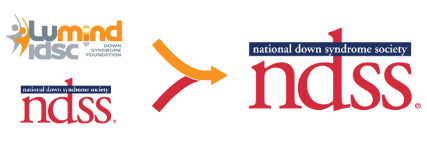Five takeaways for the Down syndrome community:
Updates on accessing the new Alzheimer’s drugsLuMind IDSC is working on many levels to break down the barriers that currently prevent people with Down syndrome and Alzheimer’s from accessing newly developed drug therapies that slow the progression of Alzheimer’s disease. Here’s a quick overview on the latest developments.
- What is the connection between Alzheimer’s and Down syndrome?
Individuals with Down syndrome have a higher risk of developing Alzheimer’s disease than the general population, and an earlier onset of symptoms. According to researchers, adults with Down syndrome have an estimated lifetime risk of up to 90% for Alzheimer’s disease, which contributes to more than 70% of their deaths. In comparison, the general population has a 12% chance of developing Alzheimer’s over the age of 65.
Among adults with Down syndrome, research shows the average diagnosis of Alzheimer’s dementia starts in the early 50s. As the disease progresses, memory and function decline precipitously, with death occurring, on average, within five years.
Much effort has been invested in studying this disease in people with Down syndrome to determine its cause, course, and eventual treatment. Researchers are working to find a way to prevent its occurrence and a new class of Alzheimer’s disease drugs, called anti-amyloid antibodies, may show promise in stalling the disease in adults with Down syndrome.
Research shows that individuals with Down syndrome produce extra amounts of amyloid protein when compared to neurotypical individuals. This is because the gene that is responsible for the creation of amyloid protein is located on Chromosome 21; people with Down syndrome have an extra chromosome 21, and, therefore, produce more amyloid protein. Over time, amyloid proteins turn into amyloid plaques that impact brain function. You can learn more here.
Newly developed Alzheimer’s disease drugs, called anti-amyloid therapies, are designed to remove amyloid plaques in brain tissue, and thereby slow the advance of Alzheimer’s disease. While this class of drugs has only been proven safe and effective in tests involving people who don’t have Down syndrome, researchers theorize that the new drugs could also slow the development of the plaques in the brains of people with Down syndrome.
- What are the recent medical drug advancements in treating Alzheimer’s disease?
The U.S. Food and Drug Administration (FDA) recently approved two different medications developed to slow the progression of Alzheimer’s disease. Both drugs target amyloid plaques, a hallmark for the development of Alzheimer’s disease. One is called Aduhelm™ by Biogen (read more here), and the other is called Leqembi™ by Eisai/Biogen (more info here), and neither company included people with Down syndrome in their trials.
Notably, Leqembi has more compelling safety and efficacy results than Aduhelm, and the full FDA approval of Leqembi on July 6, 2023 triggered CMS to reimburse the drug (which was not the case for Aduhelm). A third anti-amyloid drug, donanemab by Lilly, is expected to get FDA approval in early 2024. Past clinical trials of donanemab also did not include people with Down syndrome.
- If there are promising results for new Alzheimer’s drugs, what are the issues for the Down syndrome community?
There are several barriers currently impeding people with Down syndrome from accessing these new therapeutic drugs.
- Barrier 1: We don’t know if either of the approved drugs are safe for people with Down syndrome. No one with Down syndrome has participated in any of the many rounds of safety and efficacy clinical trials that have taken place to date. Determining if the drugs are safe for people with Down syndrome is the primary concern. You can read more on the CAA safety concern in this statement. LuMind IDSC is addressing this critical need with the pharmaceutical companies, and with federal agencies.
- Barrier 2: If/when this class of drugs is deemed safe for use by people with Down syndrome, we don’t know if insurers will cover the cost of its administration. In public statements issued as recently as July 7, the U.S. Centers for Medicare/Medicaid (CMS) confirmed that Medicare will reimburse these new drugs for everyone, subject to a co-pay amount by the patient and subject to the prescribing physician entering patient information in a registry.Medicaid is required by law to reimburse all FDA-approved drugs, but exact authorization criteria vary from state to state. Most adults with Down syndrome are covered under Medicaid or Medicare or both (dual eligibles). The exact individual, out-of-pocket cost of the drug and its administration will depend on the patient’s coverage (Medicaid, Medicare, or dual eligible) and the state they live in.Immediately following the FDA approval of Leqembi, CMS established a federal registry requirement, which compels doctors prescribing Leqembi to submit data to a central registry. LuMind IDSC and our partners are looking into adaptations of this registry that will be needed for adults with DS. In partnership with the National Task Group on Intellectual Disabilities and Dementia Practices and the National Down Syndrome Society, LuMind IDSC is addressing this concern directly with policymakers at CMS, with state Medicaid directors and through additional advocacy efforts.
- Barrier 3: If/when these drugs are determined to be safe, and the costs of the drugs are covered by insurers, policies have to be changed before doctors can prescribe the drugs to people with Down syndrome. Drug formulary committees in each state decide under what circumstances new drugs can be prescribed by doctors. The formulary committees issue “prior authorization” standards that vary from state to state. The prior authorizations include things like: minimum age of the patient in order to receive the drug, what their diagnosis and prognosis are, as well as other factors that determine the eligibility of a patient to receive the drug.Currently, the criteria used by these state committees exclude adults with Down syndrome as they do not recognize adaptations or reasonable adjustments that are necessary for our population to determine the presence of Alzheimer’s disease.
- What can be done about Barriers 2 and 3 – adaptations to the prior authorization restrictions and the CMS registry?
LuMind IDSC and the NTG convened a panel of international experts to formally request policy changes from state and federal agencies. Through a public “Consensus Statement,” the panel recommended a series of wording changes to reflect equality in the prescribing criteria and offered proof for such changes.
In addition, the expert panel called upon relevant organizations to provide education to prescribers, and for professional associations to issue protocols for guiding prescribers in the use of this class of anti-amyloid drugs. Having the medical community informed about these changes will be a clear sign of progress toward full access to the recently approved Alzheimer’s drugs for people with Down syndrome.
If you are interested in reading the detailed report of the expert panel, it can be accessed here.
LuMind and our partners are also working with the expert panel to provide input to CMS on registry adaptations for people with Down syndrome. Initial feedback has already been provided to CMS, and more details will be discussed with CMS directly on a call scheduled for July 25th.
In order to have revised policies in place when the drugs are deemed safe to use, and therefore avoid additional delay in treatment, the expert panel recommends facilitating access through three actions:
- Action One: States and other payers (Centers for Medicaid and Medicare, insurance companies) must adopt the proposed Down syndrome-focused equivalency criteria as soon as possible. Without altering the current prescribing criteria, a generation of aging adults with Down syndrome will potentially be denied access to new treatments. The adjustments needed are:
- Lowering the age of eligibility
- Adapting assessment scales to incorporate intellectual disabilities
- Not excluding population-specific co-occurring conditions
- Action Two: Phase 4 clinical trials in adults with Down syndrome be undertaken with similar urgency so clinicians can gain information on the safety of this class of drugs for adults with Down syndrome.
- Action Three: CMS to make adaptations to its registry that are needed for equal access by adults with Down syndrome.
- What can you do today to support a healthier future for your loved one?
Individuals with Down syndrome and their families will play an important role in accelerating Down syndrome associated Alzheimer’s Disease (DS-AD) research and access. Increased participation in clinical trials is critical for the next phase of Down syndrome research.
You can begin to lay the groundwork for a healthier future by learning more about the emerging therapies, confer with and ‘educate’ your primary care practitioners to eliminate any barriers for access to these new drugs. If your loved one with Down syndrome is eligible to participate in clinical trials, you should discuss the benefits and risks with your physician and consider trial enrollment.
 In addition, please consider joining hundreds of caregivers, self-advocates, and friends in a public demand for equity for the Down syndrome community. Sign the Equity Petition today! We’re speaking loudly with one voice about the need for safety trials and insurance coverage for life-changing drugs for our loved ones with Down syndrome. www.MedEquity4DS.org
In addition, please consider joining hundreds of caregivers, self-advocates, and friends in a public demand for equity for the Down syndrome community. Sign the Equity Petition today! We’re speaking loudly with one voice about the need for safety trials and insurance coverage for life-changing drugs for our loved ones with Down syndrome. www.MedEquity4DS.org
We invite you to learn more about the topic and discuss DS-AD with your loved one’s physician. Resource List:
- DS-AD Overview
- Screening Tool for Dementia
- Medical Care Guidelines for Adults
- Quick Guide to Signs of Alzheimer’s disease
Follow LuMind IDSC channels and register for myDSC to keep up-to-date on the latest developments in Down syndrome research.
- Register for the LuMind IDSC newsletter online at: lumindidsc.org/newsletter
- Register for myDSC, our online free resource library at: www.myDSC.org
This undertaking was a collaborative effort between the LuMind IDSC Foundation and the National Task Group in Intellectual Disabilities and Dementia Practices, with advocacy support from the National Down Syndrome Society.
